
Empress Myeongseong is a 2001 and 2002 South Korean television series that aired on KBS2.

Parliamentary elections were held in North Korea on 25 August 1948 to elect the members of the 1st Supreme People's Assembly. Organised by the People's Committee of North Korea, the elections saw 572 deputies elected, of which 212 were from North Korea and 360 from South Korea.

The South Korea men's national volleyball team represents South Korea in international volleyball competitions and friendly matches, governed by Korea Volleyball Association. The Republic of Korea (ROK) has competed in the Olympic Games eight times, but has not featured since the 2000 Olympic Games in Sydney, Australia. The national team's best performance at the Olympic Games was 5th place at the 1984 Games in Los Angeles, California, United States. The national team at the FIVB World Championship competed nine times, with their best result at 4th place in 1978. On continental level, The national team won three gold medals at the Asian Games in 1978, 2002 and 2006. And at the Asian Championship, the national team won four gold medals, two of these was at home in 1989 Seoul and 2001 Changwon and the other two are in 1993 and 2003. The national team now ranks 28th in the FIVB World Rankings.

Kim Won-bong was a Korean independence activist, Korean anarchist, communist, and later statesman for North Korea.

High Kick Through the Roof was a popular South Korean situation comedy revolving around the life of the Lee family.

It's Okay, Daddy's Girl is a South Korean television series that aired on SBS TV from November 22, 2010 to January 28, 2011.

Bridal Mask (Korean: 각시탈) is a 2012 KBS2 period drama based on the popular Korean manhwa by Huh Young-man. Set in Seoul, Korea, during the 1930s Japanese colonial era, the story follows a man named Lee Kang-to, a Korean police officer commissioned by the Japanese Police to betray his own country and aid the Japanese in the annihilation of the Korean rebellion. It stars Joo Won, Jin Se-yeon and Shin Hyun-joon.

Korean Peninsula is a 2012 South Korean television series starring Hwang Jung-min and Kim Jung-eun. It aired on newly launched cable channel TV Chosun from February 6 to April 3, 2012 on Mondays and Tuesdays at 20:50 for 18 episodes.
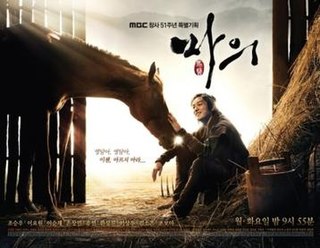
The King's Doctor is a 2012 South Korean television series depicting Baek Gwang-hyeon (1625–1697), Joseon Dynasty veterinarian, starring Cho Seung-woo and Lee Yo-won. It aired on MBC from October 1, 2012 to March 25, 2013 on Mondays and Tuesdays at 21:55 for 50 episodes. The historical/period epic drama commemorated MBC's 51st anniversary.
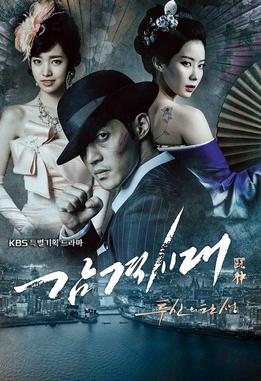
Inspiring Generation is a 2014 South Korean television series starring Kim Hyun-joong, Im Soo-hyang and Jin Se-yeon. It aired on KBS2 from January 15 to April 3, 2014 on Wednesdays and Thursdays at 21:55 for 24 episodes.

Quiz of God is a South Korean television series broadcast on cable channel OCN. It was the first medical/forensic crime investigation drama to air in Korea. The series follows genius but eccentric neurosurgeon and forensic doctor Han Jin-woo and his team as they solve suspicious deaths and unravel mysteries involving rare diseases.
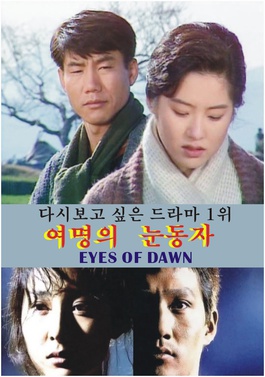
Eyes of Dawn is a South Korean television series starring Chae Shi-ra, Park Sang-won and Choi Jae-sung. Directed by Kim Jong-hak and written by Song Ji-na based on the 10-volume novel of the same name by Kim Seong-jong, the story spans the years from the Japanese colonial period to World War II, Korea's liberation and the Korean War.
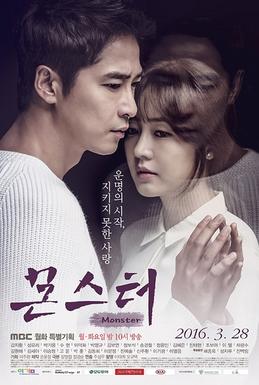
Monster is a 2016 South Korean television series starring Kang Ji-hwan, Sung Yu-ri, Park Ki-woong and Claudia Kim. It replaced Glamorous Temptation and airs on MBC on Mondays and Tuesdays at 09:55pm (KST) from March 28 to September 20, 2016 for 50 episodes.
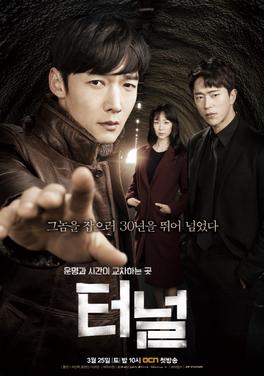
Tunnel is a 2017 South Korean television series starring Choi Jin-hyuk, Yoon Hyun-min and Lee Yoo-young. It replaced Voice and aired on cable network OCN on Saturdays and Sundays at 22:00 (KST) from March 25 to May 21, 2017 for 16 episodes. The series was inspired by the Hwaseong serial murders.

The Merchant is a South Korean historical television drama, based on the novel The Merchant of Joseon, written by Choe Inho. It tells the story of Im Sang-ok (1779–1855), a legendary merchant who lived during the Joseon dynasty. The series, directed by Lee Byung-hoon, stars Lee Jae-ryong, Kim Hyun-joo, Jeong Bo-seok and Lee Soon-jae. It originally aired from October 15, 2001, to April 2, 2002, Mondays and Tuesdays at 21:55 (KST) on MBC.

Team Bulldog: Off-Duty Investigation (Korean: 번외수사) is a 2020 South Korean television series starring Cha Tae-hyun, Lee Sun-bin, Jung Sang-hoon, Yoon Kyung-ho and Ji Seung-hyun. It is the third series of OCN's "Dramatic Cinema" project which combines film and drama formats. It aired from May 23 to June 28, 2020.

The Golden Holiday is a 2020 South Korean action comedy film written and directed by Kim Bong-Han, starring Kwak Do-won, Kim Dae-myung, Kim Sang-ho and Kim Hee-won. The film follows a detective who takes his family on a trip to Philippines and becomes a murder suspect, only to become further entangled with a criminal organization as he starts investigating the case with the help of a tourist guide, in order to clear his name. The film co-stars Shin Seung-hwan, Shin Dong-mi and Lee Han-seo. Actors Son Hyun-joo and Jo Jae-yoon make cameo appearances. It is director Kim's third film after The Hero (2013) and Ordinary Person (2017). Filipino actor Mon Confiado makes his South Korean film debut with the film shot mostly in Philippines.

The Righteous Army Command (Korean: 의군부) was a monarchist independence movement group organized in Manchuria in 1919. Their military foundation was based on the former Righteous Army fighters who escaped to Manchuria after failing to retake Seoul from the Japanese Empire. They were known for fighting alongside militant independence groups at several major battles against the Japanese. When they joined the Korean Unification Government, they came into conflict with them due to ideological differences between monarchism and republicanism which led to several bloody conflicts. Eventually they withdrew from the government to establish themselves as an autonomous organization, but due to the rise in democracy and socialism their power waned and they disbanded to joined the other autonomous organizations.

















